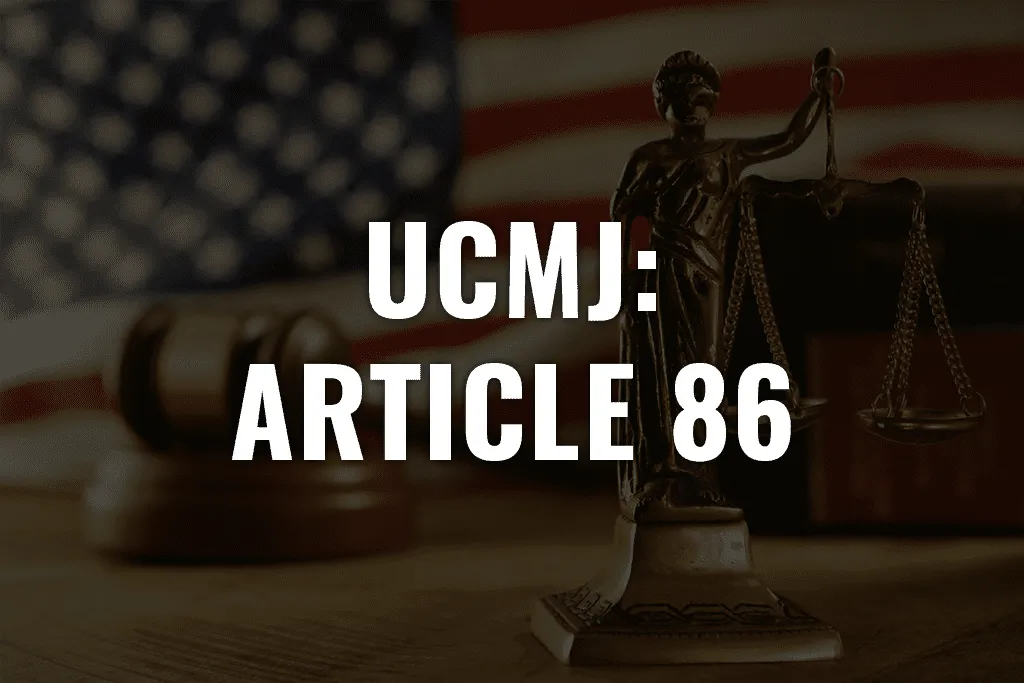The Uniform Code of Military Justice (UCMJ) governs the conduct of all members of the U.S. armed forces. Among its many provisions, Article 86 UCMJ plays a critical role in maintaining military discipline by addressing “Absence Without Leave,” commonly referred to as AWOL. This article clearly defines what constitutes unauthorized absence, outlines potential penalties, and explains the impact such offenses can have on a service member’s career.
What is Article 86 UCMJ?
Article 86 UCMJ makes it a criminal offense for a service member to fail to be at their appointed place of duty without proper authorization. This includes failing to show up, leaving a post without permission, or not returning at the required time.
Three primary forms of absence covered under Article 86 UCMJ include:
- Failure to Go – Not reporting to the assigned place at the specified time.
- Going AWOL – Leaving duty without authority and not returning as ordered.
- Extended Absence – Remaining absent for a prolonged period without approval.
It’s important to distinguish AWOL from desertion (Article 85), which involves the intent to permanently abandon one’s service.
Elements of the Offense
For a violation of Article 86 UCMJ to be proven, the prosecution must establish:

- The accused was required to be at a specific place of duty.
- The accused knew about this obligation.
- The accused failed to be present or remain there without proper permission.
Even unintentional absence can still result in charges, though intent often impacts the severity of punishment.
Penalties for Violating Article 86 UCMJ
The consequences for breaking Article 86 UCMJ vary based on the length of absence, circumstances, and the resulting impact on military operations. Possible penalties include:
- Nonjudicial Punishment (NJP) – For minor cases, such as restriction, extra duty, reduction in rank, or forfeiture of pay.
- Court-Martial – For more serious or prolonged absences, potentially resulting in confinement, significant loss of pay, or a bad-conduct discharge.
- Impact on Career – Even a minor AWOL offense can affect promotion eligibility, security clearances, and long-term military service.
The Manual for Courts-Martial outlines sentencing guidelines to ensure consistent application of penalties.
Possible Defenses to Article 86 Charges
Not every unauthorized absence under Article 86 UCMJ is a clear-cut case. Potential defenses include:
- Mistake of Fact – Believing, in good faith, that one was not required to be at a certain location.
- Miscommunication – Confusion over orders or reporting times.
- Emergency Circumstances – Serious medical or family emergencies preventing attendance.
- Administrative Errors – Incorrect duty rosters or faulty record-keeping.
A skilled military defense attorney can help examine these circumstances and present evidence to support the defense.
Why Article 86 UCMJ is Important
The military relies heavily on punctuality, reliability, and discipline. Unauthorized absences can disrupt unit cohesion, affect mission readiness, and place additional burdens on fellow service members. Article 86 UCMJ ensures accountability and reinforces the commitment every member makes when joining the armed forces.
Conclusion
Article 86 UCMJ serves as a cornerstone of military discipline, clearly defining and penalizing unauthorized absence. While the penalties can be severe, each case is unique, and a strong defense can significantly influence the outcome.
If you or someone you know is facing an Article 86 UCMJ charge, it’s essential to act quickly. Seek legal counsel from an experienced military defense attorney to protect your rights, career, and reputation. In the military, showing up is more than just a duty—it’s a commitment to the mission, the team, and the nation.
